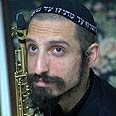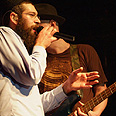


The sun is coming up over Masada. Three bearded men stand on stage, skullcap on their heads, fringes peering out from their trousers. The mixed young crowd, immodestly dressed, sings along to the words, yelling at the top of their lungs.
This is not a repentance convention but rather a powerful musical trinity: Eviatar Banai, American Hasidic Jewish reggae musician Matisyahu and religious Jewish saxophone player Daniel Zamir.
A year has past since this spectacular event. The situation appeared to be a bit odd last time, but it seems we have since gotten used to the strange combination of holy and secular, especially as more and more musicians become closer to religion. On the one hand clubs redolent with sex, alcohol and rock n' roll, and on the other hand haredi musicians.
"It's the story of my life," smiles Zamir. "Matisyahu and I talk a lot about the fine line we're walking and even crossing a little bit. I go to places I wouldn't want my son going to, but in my eyes this is exactly what God wants me to do because I can endure it."
Doesn't it ever get you into extreme situations?
"I had a concert once on Tisha B'Av (the Ninth of Av, an annual fast day in Judaism) with Micha Shitrit. We left while it was still the day of the fast, one of the most stressful and difficult days in Judaism. I arrived at the pub on that holy day, the sun was almost setting, and right when I walk in I see a huge sign: 'The meal of the day: Pizza with chicken sauce.' I thought to myself: 'What am I doing?' I called my producer and asked that they don't serve food during the gig. I'll go as far as I can to connect with people, until the limit and even a bit beyond – but I won't push it."
What's the reaction from the secular audience?
"I think they enjoy seeing this odd creature on stage. I performed once with Berry Sakharof at the Zappa and people were literally laughing in my face. They came to see Berry doing rock n' roll at the Zappa, and suddenly a haredi man comes on stage. They didn't see it coming. This is my mission in this world. It's not easy but somebody has to do it."
From matkot to Judaism
One needs to take a long breath before naming all of the Israeli musicians Zamir has worked with.
"During the last couple of years I've gotten to work with Shuli Rand, Rami Kleinstein, Meir Banai, Assaf Amdursky, Eviatar Banai, Eran Tzur, Shlomi Shaban, Berry Sakharof, Yoni Rechter, Shotei Ha'nevua, Yuval Banai, Shai Gabso, Shlomo Gronich, Amir Benayun, Ariel Zilber, Kobi Oz, Micha Shitrit, Shem-Tov Levi," he recalls after long hesitation. And this is only a partial list.
Female singers, on the other hand, are not included on that list. "I don't perform with women singers," he explains. "Female instrumentalists are okay. I have a show coming up with Tamar Eisenman, who's only going to play."

Zamir, Matisyahu and Banai on stage (Photo: Tamar Meiri)
Zamir was born in Petah Tikva 32 years ago. At age 12 he started playing the saxophone. "I love this instrument dearly because it comes from the inside. Your entire entrails become part of the music," he says.
When he was 18 he gratudated with honors from jazz studies at the Thelma Yellin High School of the Arts and enlisted in the army. "After a few months they discovered I was underweight so they assigned me a temporary profile and scheduled an exam," he recalls. "I drank a lot of juice before the exam and the doctor looked at my stomach and asked if I needed to go to the bathroom, but eventually he let it slide. Later on they found out I was still underweight and it was over."
Are you still traumatized?
"All musicians, especially in my field, aren't exactly the greatest reconnaissance combatants. My friends looked at me funny because I wanted to enlist. But I really wanted to and when it didn't work out I realized it wasn't my calling. I started working as part of a haredi wedding band, saved up money and flew to New York," says Zamir.
Why, what's wrong with staying right here?
"As a jazz musician it was a place I had to get to. It was the end of Bibi's first term. You see, before I left I had pictures of Arab Knesset members on my walls, Meretz were like the extreme right-wing for me. I was one of the 'candle children' who cried at the Square when Rabin was assassinated and when Bibi won it was like the ruin of the State for us. I just closed the door and left."
The first band he founded was called Satlah, which preformed at prominent festivals across Europe and the United States. Jazz newspapers all over the globe were excited about the young talented man, who had begun his spiritual journey trying to figure out his life's meaning. It took him a long time to discover Judaim.
"I didn't connect spirituality with Judaism," he smiles. "I tried Zen, Bodenheim, Islam, Christianity, Khalil Gibran, Martin Luther King, I tired it all. The last place I thought about was Judaism. In the mainstream Israeli consensus Judaism is associated with something dirty, sweaty, and outdated."

Religious musicians, secular crowd (Photo: Tamar Meiri)
When Zamir arrived at Eilat for the Jazz festival over a decade ago, the connection was made. "We swam in the ocean and an elderly man came up to me with Matkot (a paddle ball game) and asked if I wanted to play," he says.
What's the connection between Matkot and Judiasm?
"The ball fell to the ground at one point and we went to pick it up. The man looked me in the eye and said he feels at though I'm looking for spirituality and that he has the answer for me. I was shocked. I shared his story with me and it was similar to mine. He then suggested I read the Book of Proverbs and Ecclesiastes. I got back to New York and started reading it on the subway and was enchanted."
What brought you back to Israel?
"I asked God to give me a reason to come back. A few days later I received a phone call from Hatav Hashmini (Israeli record label) saying they wanted to meet me and work on an album. I packed my bags and came back to Israel."
You are truly an eccentric
"Being an eccentric is my life. I live in the musical and cultural scene, but because of my lifestyle I am not a part of it. On the other hand, I also don't really belong to my haredi community. I have no place in either of these worlds."
On occasion Zamir encounters tough moral dilemmas: Art vs. belief. At one such occasion Zamir preformed the song 'Shir Ahava Hayali' which has such lyrics as: "And when we put our hands on lovely rears."
"Before the show I looked at the lyrics and I was shocked," he recalls. "The words are quite appalling, very unreligious. During the concert I was playing and thinking to myself: 'What's wrong with you?' It really confused me. I also sit down with friends at rehearsal studios where there is lots of sex, drugs and rock n' roll, and then go home at talk to the manager of synagogue affairs in Yiddish. Aside from Matisyahu I don't think anyone lives like this. It's exciting, amazing and wonderful – but it comes with a price. It makes me crazy."
Not denying the past
This year his eighth album is expected to come out titled "Ga'aguah Le'can" ("Longing for here"), featuring instrumentals with original melodies. The title song was written together with his best friend, Eviatar Banai.
On Saturday Zamir will début his album for the first time at Ha Maabada in Jerusalem and at Reading 3 in Tel Aviv the following night.
"Eviatar and I have a strong personal bond," says Zamir. "We are very close personally. He's a very real and deep person, and has something very pure about him. I love him dearly and I consult with him a lot because we both live a similar lifestyle, though he managed to disconnect himself from the musical scene while I'm still submerged in it."
Both of you face the same dilemmas. Eviatar even changed his lyrics.
"There is the Uri Zohar approach – to block out anything that ever happened and not talk about it anymore. But I think that the secular experience led me to religion, it is because of it that I'm here. So I don't feel as though I've stopped being someone, but that this is a continuation of everything I've ever been. Of course I've changed my lifestyle because I didn't used to go to the mikveh and wear phylacteries every day, but every part of my personality helps the other part."
What's covering your walls now instead of Arab Knesset members?
"Rabbi Menachem Mendel Schneerson of the Chabad Lubavitch dynasty."
- Follow Ynetnews on Facebook















